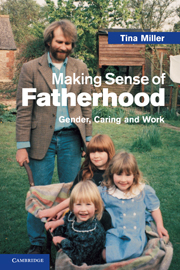4 - Making sense of early fathering experiences
Published online by Cambridge University Press: 01 March 2011
Summary
We had a really nice time at the start but it does feel like reality has kicked in and now you are just trying to manage between you and juggle it.
(Ben)The birth of a baby signals, and enables, men's involvement in a child's life in ways that could only previously be imagined, and lives and selves can be changed forever. Whilst the embodied physicality of pregnancy experienced by women can leave men feeling marginal and detached from the process of becoming a parent, the act of birth can change everything. Birth experiences, which are often different to what has been planned for and expected, set the scene for the early weeks and months of new fatherhood as men come to terms with what, in practice, ‘being there’, sharing care and doing fathering will involve. But all these experiences are shaped implicitly, explicitly and powerfully by and through gendered and societal expectations that men's lives continue to be largely understood in relation to paid work outside the home and little altered by parenthood. This provides a particular backdrop against which fatherhood and fathering practices are made sense of and which is significantly different to those that underpin expectations around motherhood and mothering practices (see chapter 6). For all the contemporary shifts which can be documented around men's lives – and so masculinities – their continued association with paid work and provision limits not just the possible parameters of their involvement but also how involvement can be conceived of and articulated.
- Type
- Chapter
- Information
- Making Sense of FatherhoodGender, Caring and Work, pp. 83 - 110Publisher: Cambridge University PressPrint publication year: 2010



